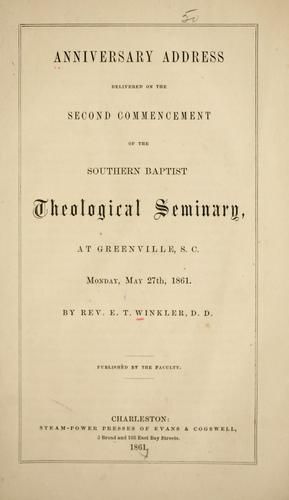The war is the talk of the town in Greenville, South Carolina as the Southern Baptist Theological Seminary graduates its second class. Nearly one hundred years later, a historian would thus comment on this day:
“When the second commencement of Southern seminary was held on May 27, 1861, great excitement prevailed in the seminary family. But the speaker of the occasion, Dr. E.T. Winkler of Charleston, did not even utter a word about the peril of the hour. Instead he commended the Seminary’s wise plans for the future and exalted the work of the ministry.”
In reality, the conclusion that Winkler ignored the war in his address is not exactly correct. At the time of the writing of the seminary’s history referenced above (1959), Southern Baptist church historians yet followed a long-held pattern of not acknowledging African/black slavery as the primary cause of both the creation of the Southern Baptist Convention (1845) and the subsequent Civil War.
At one point comparing the historical era of Charlemagne to that of “our present political crisis,” commencement speaker Winkler in 1861 refers to the North (United States) as barbarians. In addition, Winkler defends biblical patriarchalism, a phrase that hearers understand as a white defense of the southern institution of slavery. Similarly, a favorable reference to the “curse upon Canaan” is a common biblical apologetic for southern slavery. In the larger perspective, Winkler exalts theology as the overriding force that holds a godly society together.
The charge to graduates includes the presentation of ministry as the extension of Christ’s will to “subdue the world to his dominion,” echoing language used by Baptist nationalists in ascribing the mission of God’s chosen nation, the Confederacy. Ministers of the gospel are to be “engaged in gathering God’s children out of the companies of his enemies,” a reference at least in part to the war, for the “sun of righteousness will rise” and one morning there will be “nothing to fear” … “beyond the scenes of the present.” God’s true ministers, Winkler insists, will be staunch defenders of truth, a truth that includes the righteousness of slavery and white supremacy.
Speaking eleven years later in 1872 during Reconstruction, Winkler, in a spirited defense of the Ku Klux Klan, further elaborates on the rightness and necessity of the oppression of blacks and the upholding of white supremacy: “In a state of society where there is no law, and where men must form temporary organizations for the redress of intolerable grievances and the maintenance of social order, justice itself is perverted by attacks on these organizations.” The grievances refers to northern resistance to southern white violence against blacks, while “the maintenance of social order” is southern language for white supremacy.
Today’s commencement address to the graduates of the Southern Baptist Theological Seminary, in short, is a stout defense of black slavery, white supremacy, and the Confederacy – institutions all viewed as critical to God’s kingdom on earth, to be championed and upheld by Southern Baptist ministers under the rubric of proper theology.
Sources: First quote, William A. Mueller, A History of the Southern Baptist Theological Seminary, 1859-1959 (Nashville: Broadman Press, 1959), 30; “Anniversary Address Delivered on the Second Commencement of the Southern Baptist Theological Seminary, by Rev. E. T. Winkler, 1861 (link); Paul Harvey, Redeeming the South: Religious Cultures and Racial Identities Among Southern Baptists, 1865-1965 (Chapel Hill: University of North Carolina Press, 1997), 42.



